In this post, Policy Associate Velie Sando highlights how governors are championing workforce development, and by extension Career Technical Education (CTE) in their 2024 State of the State addresses.
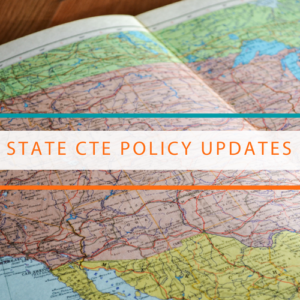 As the new year unfolds, 38 governors across the nation have delivered their much-anticipated State of the State addresses, outlining their vision for the future and key educational priorities, including career readiness. Some governors vouched for increased funding toward CTE initiatives while others highlighted accreditation as a means to address workforce demands in their state. The emphasis on career readiness within the State of the State addresses aligns with Advance CTE’s Without Limits: A Shared Vision for the Future of Career Technical Education (CTE Without Limits), which leverages CTE as a catalyst for ensuring each learner can reach success in the career of their choice.
As the new year unfolds, 38 governors across the nation have delivered their much-anticipated State of the State addresses, outlining their vision for the future and key educational priorities, including career readiness. Some governors vouched for increased funding toward CTE initiatives while others highlighted accreditation as a means to address workforce demands in their state. The emphasis on career readiness within the State of the State addresses aligns with Advance CTE’s Without Limits: A Shared Vision for the Future of Career Technical Education (CTE Without Limits), which leverages CTE as a catalyst for ensuring each learner can reach success in the career of their choice.
This year, as in previous years, governors continue to emphasize workforce development in their efforts to prepare learners for the evolving job market. Thus far, 24 addresses implicate CTE in some capacity, as governors highlight apprenticeships, training programs, and initiatives such as free community college to address emerging labor market needs.
Apprenticeships
With growing labor market demands, states including New Jersey and Pennsylvania have invested in apprenticeship programs to meet workforce needs in their state. New Jersey Governor Phil Murphy highlighted doubling the number of apprenticeship programs in fields such as life sciences and renewable energy, reflecting a proactive approach to meeting workforce demands in emerging sectors. Similarly, Pennsylvania Governor Josh Shapiro celebrated 33 new apprenticeship programs, mentioning significant enrollment numbers and program expansions. Elsewhere, Tennessee Governor Bill Lee proposed expansions in apprenticeships, particularly in high-demand sectors like healthcare. Tennessee’s proposal aims to bridge the gap between education and employment, ensuring a skilled workforce meets the needs of the healthcare industry. Similarly, Colorado Governor Jared Polis aims to create 100 new private sector apprenticeships by June 30 and increase state government apprenticeships by 50%, while Missouri Governor Mike Parson announced a $3 million investment in youth apprenticeship opportunities.
Free Community College
Recognizing the pivotal role of education in workforce development, states including Colorado and Massachusetts have implemented initiatives to make higher education more accessible. Governor Polis of Colorado highlighted that their expansion of free community college for in-demand careers has already benefited 3,500 learners, empowering them with the skills needed to thrive in today’s job market. Massachusetts Governor Maura Healy celebrated the MassReconnect program which offers free community college to adults aged 25 and older, removing barriers to education and training for mid-career professionals. Similarly, Michigan Governor Gretchen Whitmer called for tuition-free community college for all high school graduates, addressing the financial burden often associated with pursuing higher education and ensuring equitable access to skill-building opportunities for all graduates.
Training Programs
Governors recognize that investments in specialized training programs are crucial for addressing evolving workforce needs. Rhode Island Governor Daniel McKee celebrated the launch of the first State Institute for Cybersecurity & Emerging Technologies at Rhode Island College, underscoring the importance of staying ahead in emerging fields, laying the groundwork for a skilled workforce equipped to tackle cybersecurity challenges. Missouri invested $54 million in workforce training through the MoExcels initiative, demonstrating a commitment to equipping postsecondary institutions with the resources needed to deliver high-quality training programs.
Michigan highlighted free community college and training for medical technicians and electricians aged 21-24 through the Michigan Reconnect program, catering to the growing demand in these critical sectors. Massachusetts proposed building a workforce plan for growing industries, while Maine Governor Janet Mills celebrated the Maine Jobs Plan for investing over $200 million in skills attainment and training programs. Elsewhere, Idaho Governor Brad Little announced the Idaho LAUNCH grants that will cover up to $8,000 in costs to enroll in education or training programs after high school, incentivizing residents to pursue education and training aligned with in-demand careers.
Governors across the nation are prioritizing workforce development initiatives to ensure a skilled and adaptable workforce for the future. By investing in apprenticeships, expanding access to free community college, and bolstering training programs, states are laying the foundation for economic growth and prosperity. Outside of workforce development, governors are also investing in rural communities to mitigate the barriers that hinder their access to educational and training opportunities. CTE can serve as the connector offered in communities to connect secondary and postsecondary classroom learning, work-based learning and apprenticeship, and skilling and reskilling training programs.
Advance CTE and ACTE’s eleventh annual State Policies Impacting CTE: 2023 Year in Review and Advance CTE’s Longitudinal Year in Review Analysis Tool examine CTE and career readiness policies across the nation. While the report focuses on policy trends, the tool comprises every CTE-related policy enacted within each state since 2013.
 For further insights and resources connected to workforce development, check out our Learning that Works Resource Center.
For further insights and resources connected to workforce development, check out our Learning that Works Resource Center.
Velie Sando, Policy Associate


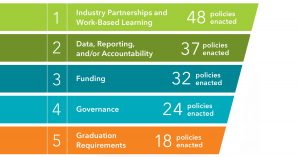
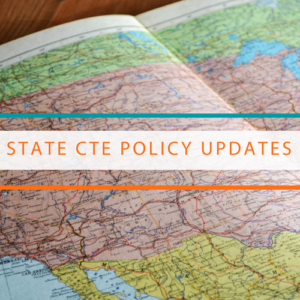 October 7 was National Manufacturing Day but, in Ohio, the celebration lasts the entire month. . Ohio uses this time to raise awareness of the various manufacturing pathways available to learners in the state and inspire those learners to join. Ohio already has significant investments in the manufacturing economy which generates more than $125 billion. However, knowledge of how many different skill sets and jobs are available in the industry is still not widespread. By taking advantage of Manufacturers Month, this post highlights the innovative ways Ohio is uplifting the manufacturing pathway as well as leveraging the support of The Ohio Manufacturers’ Association (OMA), which is bringing awareness to various grants and programs, some of which have been made recently available to Ohio residents.
October 7 was National Manufacturing Day but, in Ohio, the celebration lasts the entire month. . Ohio uses this time to raise awareness of the various manufacturing pathways available to learners in the state and inspire those learners to join. Ohio already has significant investments in the manufacturing economy which generates more than $125 billion. However, knowledge of how many different skill sets and jobs are available in the industry is still not widespread. By taking advantage of Manufacturers Month, this post highlights the innovative ways Ohio is uplifting the manufacturing pathway as well as leveraging the support of The Ohio Manufacturers’ Association (OMA), which is bringing awareness to various grants and programs, some of which have been made recently available to Ohio residents.  In August, the OMA was named one of the 32 finalists for the “
In August, the OMA was named one of the 32 finalists for the “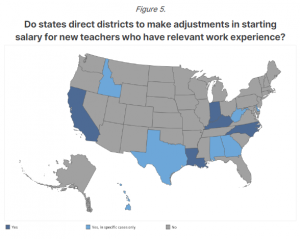
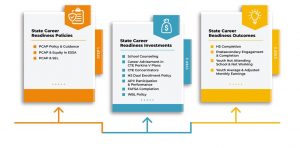 In May, the Coalition for Career Development Center released the first annual
In May, the Coalition for Career Development Center released the first annual 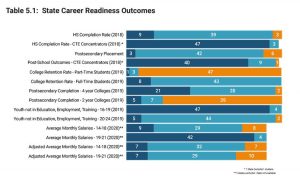 For postsecondary CTE concentrators, the report finds that 40 states are placing 70 percent or more of secondary learners into postsecondary training and education, military or employment after high school graduation. Only three states, however, are placing 70 percent or more of all high school graduates into either a two-year or four-year postsecondary training or education program. The report recommends expanding post-school data points as well as counting military service and employment as post-school outcomes for learners.
For postsecondary CTE concentrators, the report finds that 40 states are placing 70 percent or more of secondary learners into postsecondary training and education, military or employment after high school graduation. Only three states, however, are placing 70 percent or more of all high school graduates into either a two-year or four-year postsecondary training or education program. The report recommends expanding post-school data points as well as counting military service and employment as post-school outcomes for learners.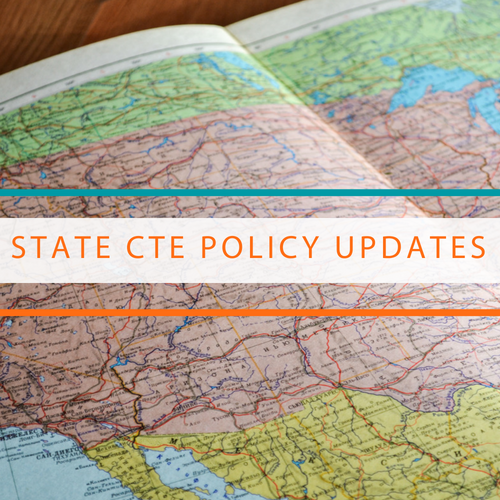 State education agencies, legislators and educators faced significant challenges from
State education agencies, legislators and educators faced significant challenges from